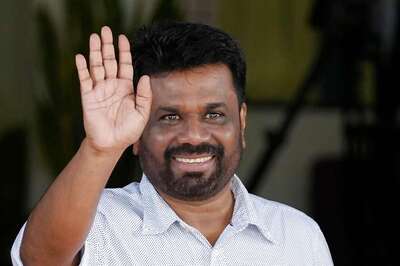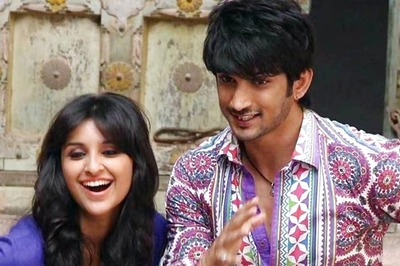
views
With the entry of young Sujay Vikhe Patil, the third generation politician from the influential Vikhe Patil family, into the BJP, the issue of dynasty has again come to the fore in Maharashtra in the run-up to the Lok Sabha polls.
Parth Pawar, grandnephew of Maratha strongman Sharad Pawar, has been named the NCP candidate from Maval in Pune district, the home turf of the Pawar clan, bolstering the dynasty card.
Pawar is not alone. Fact of the matter is that everybody who is anybody in politics is attempting to create a dynasty from the local level to the top.
“Let values and principles go to the dogs. Family should take precedence.” This is the political reality of present-day Maharashtra which once boasted of the ideals of Mahatma Phule, Shahu Maharaj and Dr BR Ambedkar.
Like several other states, the dynasty card is in currency in almost all political parties in the state, barring the Left parties which have so far not been affected by the virus. The card is now in full play in the run-up to the Lok Sabha elections and at a time when Assembly polls are not far away.
The BJP, which proudly proclaims its antipathy to the ‘dynasty culture’ of the Congress and insists that it has made a chaiwala the Prime Minister, is also not immune from the disease, notwithstanding its claims of being a "party with a difference".
In fact, Chief Minister Devendra Fadnavis, who has emerged as a leader in his own right in the last five years, is a product of dynasty. His father Gangadhar Fadnavis was a BJP legislator.
But surely, the Congress takes the cake when it comes to raising dynasties from the grassroots level in the state to the top.
In fact, around two decades ago, a noted Marathi journalist, the late Varunraj Bhide, had done a scholarly analysis as to how some 100 Maratha families, which are related through marriages, have been dominating Maharashtra in the cooperative as also political sector, implying that the ‘dynasty’ is bound to grow at all levels in the state. He had hit the nail right on the head.
The Congress might have fallen on bad days for the moment, but it must be understood that the BJP had raised its graph in the state by taking prominent Congressmen as also other opposition leaders on board at the time of the Modi wave in May 2014. The BJP’s rags-to-riches story, from the fourth spot to the first, has been facilitated by several dynasties as Narendra Modi-Amit Shah went methodically to grow the saffron footprint.
The problem being witnessed now in several local BJP units is that the loyalists who toiled hard to first make Atal Bihari Vajpayee and now Modi the Prime Minister feel a neglected lot as ‘outsiders’ have taken over the organisation lock, stock and barrel.
It is a ubiquitous sight of leaders in Maharashtra openly lobbying for their kith and kin to get nominations to come to power and thereby control their ‘family’ business. This is because dynasty has become the new identity and reality of the state once known for its progressive ideology and development.
The revolt by Sujay Vikhe, the son of Leader of Opposition in the Maharashtra Assembly Radhakrishna Vikhe Patil and the grandson of Congress veteran Balasaheb Vikhe Patil, has not surprised people. This is because he had kept all his options open to seek a ticket before pressing his case before the Congress. He joined the BJP after failing to get a ticket from the Congress despite hard lobbying from his family for the Ahmednagar seat, the district known for being the pocket borough of the Vikhe family.
And the BJP promised to field him from the seat, denying ticket to its sitting MP.
Besides the Fadnavis family, there are other political families in the BJP like the Mundes, Mahajans, Khadses, Gavits whose members are currently MPs. Pankaja Munde, one of the daughters of the late deputy chief minister Gopinath Munde, is a senior Maharashtra minister.
But the Congress and the NCP have created a record of sorts by promoting dynastic rule from tehsil to state level under the guise of ‘elective merit’. Three former chief ministers from the Congress — Ashok Chavan, Prithviraj Chavan and the late Sudhakarrao Naik — are sons and nephew of Congress leaders SB Chavan, Premalatai and DR Chavan, and VP Naik, respectively. Former deputy chief ministers Ajit Pawar and Vijaysinh Mohite Patil also derived mileage from their families.
The Congress cannot shift the blame to others for it is perceived to be ‘mother of dynastic rule’ in India. This was quickly adopted and practised by regional parties across the country from Kashmir to Kanyakumari, and is now spreading in the BJP which once talked about chaal, charitra and chehra.
To cite an instance, the Samajwadi Party might be talking of socialist principles of Ram Manohar Lohia and Madhu Limaye, but all outgoing members of the party are close relatives of Mulayam Singh Yadav.
As far as Maharashtra is concerned, a peculiar development is being witnessed for the past few decades. One dynasty or a couple of dynasties are controlling politics, power and economy in districts. In fact, districts and tehsils are known by such families in western Maharashtra, Vidarbha, Marathawada, north Maharashtra and Konkan regions, while Mumbai is controlled by the Thackeray family.
Although Chavans, Patils, Pawars, Deshmukhs, Shindes, Ranes, Thorats, Kadams, Mundes, Kshirsagars, Meghes, Gavais are controlling the state, Prakash Ambedkar is worshipped among Dalits as he is the grandson of Dr BR Ambedkar; Aditya Thackeray, the third generation of the Thackeray family has now gradually started controlling the Shiv Sena.
The rapid growth of political dynasties in the state is frustrating genuine political workers aspiring for change.
“When you are winning, you are creating a dynasty,” a billionaire American businessman had said sometime back in a different context. The words appear to fit the political reality of present day Maharashtra.
(The author is a senior journalist. Views are personal.)




















Comments
0 comment